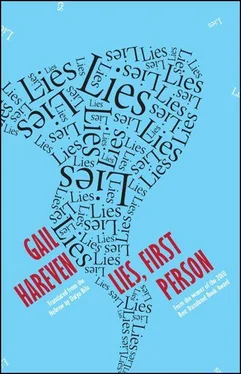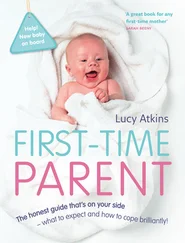That’s what I did, trembling all over, that’s all, no more. And what I did was enough. Although even after the existence of the medical file was proved, they could, on principle at least, have gone on contorting themselves in additional doubts and hesitations. They simply no longer had the strength to keep up their denial.
When finally dispelled their doubts, our parents started to blame each other for what they called “our calamity”—“Your cousin,” “Your refusal to sell this accursed place and get the girls out of here,” “Your blindness,” “All the times I begged you to sell. You know yourself how I pleaded with you.” And so on, until Erica fled the scene with another bout of sickness.
I imagine that it was the confrontation with the truth that pushed her into the arms of the Digoxin. And I don’t care. After years of hypochondria, at least she died of a genuine heart disease.
The important thing is that Elisheva couldn’t avoid sensing their disbelief. Even though they never expressed it to her in so many words. And no less important is that from the outset she received my explicit and unconditional belief. I was the one who believed it all immediately, and this being the case, it was up to me to go on believing her: even when she talked about people who were blue, and days when the dangers outside were particularly grave.
Her wounded eyes never left me, begging for my belief, and I was incapable of betraying the belief that she begged for. This is my explanation for what happened in me, I have no other, and what happened was that gradually I began to see reality as if through her eyes, and even when I was sitting in class at the university, far from her, my eyes would seek out the “downstairs people” and separate them from the others: the boy with the big backside who jiggled his legs until the desk shook and couldn’t stop; the girl whose facial skin was stretched in the direction of her ears by hidden screws. How did they dare go out on this fine day and come and sit among us?
I beat around the bush, sat myself in a classroom among strangers, and accused myself of trivialities, simply in order to put off admitting the most shameful thing of all. And the most shameful thing of all, the most despicable, is that drop by drop I absorbed my sister’s beliefs until I began to see her as she saw herself, and for longer and longer stretches of time I put her in a different category from myself, as if she had been born into another race. She said that she was ugly, and I looked at her and saw ugliness. She believed that people like her shouldn’t go out, and I was embarrassed by the thought of walking next to her in the street and being associated with her.
As sleepless night followed sleepless night I found myself turning into a creature made of blue, and into one of the “upstairs people.” I began to see myself as being of a different substance, destined for a separate fate, naturally and essentially different from her sister-by-accident. It was a fact that I had been endowed from birth with a quick mind and a firm resolve. A fact that I knew how to say “I’m not having my photo taken.”
I didn’t see things like this all the time. There were also times of tender compassion and times when I was seized by a terrible, wrenching pity. There were definitely moments when I succeeded in conjuring up memories of a hand holding mine, and an older sister who insisted on bathing me. But these hours and moments grew fewer and fewer, and my pity for myself — sentenced as I was to live at close quarters with someone of her kind — increasingly filled the space left by that other pity. I was revolted by her flip-flops decorated with plastic flowers, by the movements with which she shook crumbs off her clothes, and by the way she came too close to me in the kitchen. I loathed the electric light in the apartment, the stupid sound of the television, and the pleas that stuck to me even when I went out. It happened that I cruelly refused to tell her when I was coming back.
And once it happened that I came home very late. It didn’t just “happen.” “Happen” means “happenstance.” I deliberately came back hours late.
I don’t remember how much vodka I downed in order to steel myself for this piece of cruelty, but I know very well that when I was already back in the apartment I crawled on all fours to the bathroom to vomit my guts out, and that the frightened Elisheva followed me like a shadow with a damp cloth and a glass of water. I told her that I had been attacked by a virus on my way home, “it’s nothing, it’s just a virus,” and she of course believed me, because in our folie à deux we believed everything and the deal was mutual.
On fine days, on the clear days when objects shine as if they’re under glass, on such days in particular I would imagine that I wouldn’t return to the crumb-strewn gloom; that I would run away, go to Italy to scream at our father, put my sister on a plane and send her to him like a parcel. But until I broke, for those ten months — is ten a lot or a little? — I returned and returned, because I couldn’t do otherwise. Today I say that my sister doesn’t have suicidal genes, and that all her madness was directed toward survival, but then — what did I know?
When I informed my husband of my intention to go to America to see my sister, he immediately took me into his arms, assured me of my worth and the worthiness of my decision, and promised while combing his fingers through my hair to accompany me on the journey.
On the basis of everything I have said so far about the two of us and our relationship, I could have pulled an Alice here, adopted her style and written this chapter accordingly. Some of you would no doubt have believed it. People like swallowing sugar-coated rubbish. But that’s not really the way things happened, and my husband’s reaction was rather different, although I found sweetness in it too.
We were in bed, I announced, “I’m going to see my sister,” and Oded put his hand on my thigh and without opening his eyes stated in the royal first person plural: “We’re sleeping now, not talking.” Even half-asleep he could be charming, and I smiled into the darkness of our bedroom and remembered to count my blessings, which included lying in my own beautiful home next to my own unruffled Prince Charming. I kissed his warm shoulder and let him sleep till morning.
Oded was then busy writing a complicated appeal — Menachem had begun to cut down on the hours he spent in the office — and in the morning he asked me to wait until Thursday at least before coming to any decision about the journey. “If you feel that you’re ready for this, then obviously you should go, but after so many years when you haven’t seen each other, the decision can wait for another three or four days.” And I waited, not until Thursday, when he came home exhausted in the middle of the night, and not until Friday, when we had house guests, but until the Eden of Saturday afternoon, after the guests had gone. I didn’t mind waiting. I was determined to go, and once I had made up my mind, making generous gestures to match my husband’s didn’t present a problem.
We sat in the living room; it was getting too cold outside, Oded smoked his Saturday joint and outlined the compromise agenda he had worked out for me. As much as he longed to get rid of the disturbance in our lives, my practical husband realized that getting rid of it completely wasn’t an option. What was on the cards was only to distance the disturbance and minimize it until his wife saw things in a different light. With innocent cunning he tried to raise me to the heights of people of his ilk, people who were capable of seeing things in perspective.
Читать дальше












